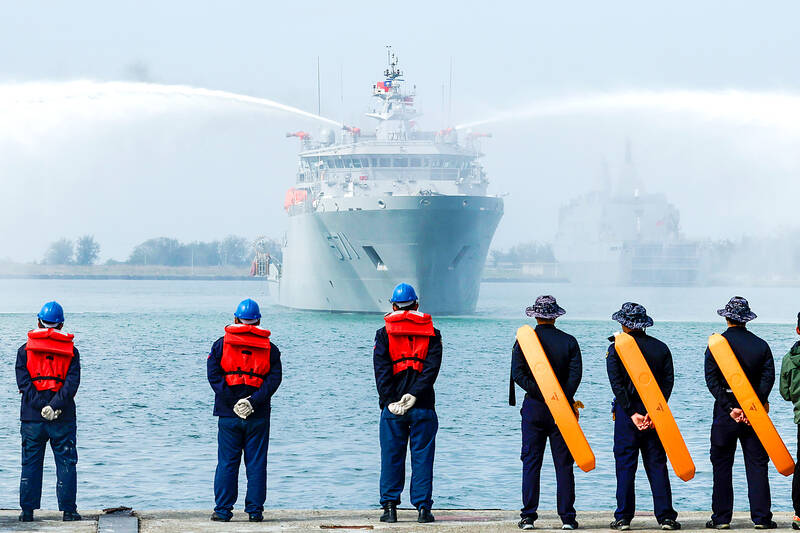The Ministry of National Defense yesterday declined to say whether Taiwan is pursuing a multibillion-dollar weapons purchase from the US, after sources briefed on the matter said that officials are in talks with Washington to procure at least US$7 billion of arms.
Three sources familiar with the situation, speaking on condition of anonymity given the sensitivity of the situation, told Reuters that Taiwan is in talks with Washington.
The package is meant to demonstrate to the US that Taiwan is committed to its defense, one of the sources said.

The Da Wu, a navy rescue and salvage ship, shoots water cannons during a drill in Kaohsiung on Jan. 9.
Photo: Ritchie B. Tongo, EPA-EFE
A second source said the package would include coastal defense cruise missiles and High Mobility Artillery Rocket Systems.
“I would be very surprised if it was less than US$8 billion. Somewhere between US$7 billion and US$10 billion,” the source added.
The White House did not immediately respond to a request for comment.
However, US National Security Adviser Mike Waltz has said he wants to speed up delivery of weapons to Taiwan.
The ministry declined to comment on specific purchases, but said it is focused on building its defenses.
“Any weaponry and equipment that can achieve those goals for building the military are listed as targets for tender,” said Major General Weng Yu-heng (翁予恒) from the Department of Strategic Planning.
The ministry would plan a special budget based on the threats posed by enemies, how urgently certain types of weapons are needed, production capacity and estimated delivery schedules, Weng added.
However, a third source said that Taiwan plans to propose a special defense budget that prioritizes precision ammunition, air defense upgrades, command and control systems, equipment for reserve forces and anti-drone technology.
Another ministry source told the Chinese-language Liberty Times (the Taipei Times’ sister paper) that the military is assessing measures to bolster the nation’s resilience, including projects related to armed forces reserves, asymmetric capabilities, precision-guided munition stockpiles, and intelligence surveillance and reconnaissance capabilities in the air and sea.
Following a national security meeting on Friday last week, President William Lai (賴清德) said that he would prioritize efforts to plan a special budget to raise Taiwan’s national defense budget to 3 percent of GDP to bolster its self-defense capabilities.
During his first term from 2017 to 2021, US President Donald Trump made regular arms sales to Taiwan, including multibillion dollar deals for F-16 jets.
The administration of former US president Joe Biden continued those sales, although often with smaller price tags.
Taiwan does not believe Trump is looking to make a “grand bargain” with Chinese President Xi Jinping (習近平) to sell out Taiwan’s interests, one of the sources said.
Trump is more concerned with putting tariffs on semiconductors, the source said.
In another sign of US commitment to Taiwan, American Institute in Taiwan Director Raymond Greene is to retain his post, three sources told Reuters, even as other US diplomatic postings undergo major reshuffles.
Additional reporting by Su Yung-yao and CNA
Source: Taipei Times - 2025/02/19




















